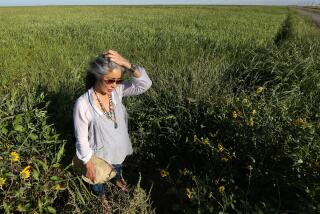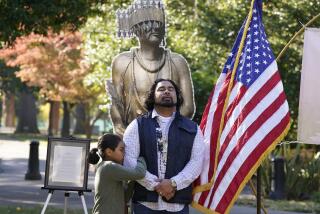Big Operations No Longer Invulnerable to Recession : 26,500-Acre Farm Threatened By Foreclosure
TRAVER, Calif. — On the wall above Don Jackson’s desk is this biblical quotation: “In quietness and confidence shall be your strengths.” But Jackson, whose aggressive management of the 26,500-acre Jackson Farms earned him a reputation as a savvy farmer, doesn’t feel like being quiet these days.
Jackson, 45, has some bitter words for the federal lending agency created to help farmers--”They didn’t give me a chance,” he contends--and said his fight to save his huge San Joaquin Valley farming operations has “been an expensive lesson.”
Last fall, Jackson filed in federal bankruptcy court in Fresno for protection from his creditors under Chapter 11 of the bankruptcy code. He listed $66 million in debts, making the Jackson Farms case one of the largest agribusiness filings ever.
The Federal Land Bank already has foreclosed on 4,000 acres of his farmlands in Tulare and Kings counties. But Jackson said he remains confident; that, given a chance to farm the remaining 22,500 acres, he can make a go of it.
Jackson Farms’ problems mirror those of other farms--small and large--in California. While the average California farmer tills 437 acres, there are hundreds of large, industrialized farms that range in size from a few thousand acres up to the 120,000-acre Kern County holdings of the giant Tenneco-West agribusiness conglomerate.
In the past, these factories-in-the-fields appeared invulnerable to recession. The current farm crisis, however, in many cases is as hard on them as it is on the small family farmers throughout the U.S. whose troubles have been well-chronicled by the news media. But the big farmers’ problems have largely been hidden from public view as bankers and farmers settle their accounts privately.
“The situation is so bad that big operators like Getty (77,000 acres) and Superior (38,000 acres) are getting out of farming,” said Tristan E. G. Krogius, president of Tenneco West. Tenneco reported its worst farming year ever in 1984 and officials at both Getty Oil Co. and Superior Oil Co. confirmed that their Kern County farm lands are for sale.
Farm loan delinquency rates in California are the highest in the nation, federal regulators report. And the state’s banks are writing off a disproportionately large share of the nation’s farm loan losses, due in large part to multimillion-dollar loans to big farms that have gone sour, experts say.
Two lenders, the Bank of America and Crocker Bank, alone charged off $200 million in uncollectable farm loans in 1984 and these banks took back nearly 100,000 acres, much of it in large blocks that have since been leased to contract managers pending liquidation.
After nearly a decade of unprecedented prosperity, the current crisis was brought on by falling crop and land prices, continued high interest rates and the strength of the dollar overseas, which has shut off many of the farm export markets. Since 1981 banks have had to refinance an increasing amount of farm debt, letting the struggling farmers defer their payments year after year in the hope that the economic situation would improve.
But for those owing the most money, the crisis has only deepened.
And, as worried bankers started demanding payments, evidence of the widespread problems has begun to crop up. In Fresno, court records revealed the McCarthy Land Co., which had owned 70,000 acres, had deeded thousands of acres and two Fresno office buildings to Crocker Bank to settle an estimated $40 million debt.
Leland McCarthy, president of McCarthy Land, would not comment on what had happened, but one of his associates acknowledged that the company had liquidated all of its holdings, including its share of 38,000 acres farmed in partnership with the Prudential Insurance Co. McCarthy continues to manage these properties.
Other banks report they also are taking back land and the number of bankruptcies are up. During the first three months of this year, 30 San Joaquin Valley farmers filed petitions in the Fresno bankruptcy court, which serves six valley counties. Nine were filed during the same period last year.
Two Other Farmers
The Jackson Farms case, largest and perhaps the most complex of these petitions, also involves the bankruptcy of two other farmers and the breakup of the 33,500-acre South Lake Farms, one of the oldest corporate agriculture ventures in the Tulare Lake Basin, south of Corcoran in Kings County.
Sitting in his small office in this tiny hamlet on Highway 99 just south of the Kings River, Don Jackson talked candidly about his struggle to salvage something of his farming business.
A professed Christian and family man who grew up in nearby Kingsburg, Jackson is a sturdy, dark-haired fellow who has the looks of a football player-turned-cowboy. He started farming on 80 acres when he was 19.
By 1962--the year he received the Fresno Junior Chamber of Commerce’s “Young Farmer Of The Year” award--his tractors were working a thousand acres and he was still expanding his holdings. Eventually he acquired 4,000 acres of row crops, fruit trees and vines on the valley’s east side.
Eye on West Side
But he also had his eye on the valley’s west side, where large-scale farming and big land deals are a way of life. Out there the farms are so big that airplanes are considered as essential for transportation as pickup trucks.
Jackson wanted to farm in the Tulare Lake Basin. His chance came late in 1980 when the 33,500-acre South Lake Farms was put on the market, bearing a $39 million price tag, by Producers Cotton Oil Co., an agribusiness firm that farms thousands of acres, operates 65 cotton gins and makes crop production loans to growers.
Jackson became one of three buyers, forming a partnership, J-W Farms, with another west side farmer, Floyd Williams, to manage 22,500 acres of the farm. Bill Rogers, a Fresno area farmer and the third partner, took over the 11,000-acre White Ranch unit.
To raise his $5-million share of the loan, Jackson refinanced his Traver area farms through the Federal Land Bank, borrowing against the rapidly appreciating land values that were being pushed up by the agricultural boom years. The land bank is a part of the Federal Farm Credit System, federally chartered as an independent, profit-making network of lenders to help the nation’s farmers.
‘Solid Deal’
“It looked like a solid deal made with three good farmers,” said James M. Schurr, a vice president of the land bank. “Farm prices were good, real estate values were increasing and we had every reason to believe that farming would continue to be profitable.”
But that was 1981, when the decade-long boom in the agricultural economy turned downward, beginning one of the steepest economic declines in decades. The poor timing caught the South Lake partners.
Cotton prices fell, the farm began losing money and Williams couldn’t pay his share when the first mortgage payment came due in the spring of 1982. Jackson scraped together enough to make the Williams’ payment and foreclosed on his partner, who later filed his own Chapter 11 bankruptcy petition.
“The land bank was forcing the issue,” Jackson said. He borrowed the payment from the Bank of America, which had been financing Jackson’s Traver farm operations. Bank of America was protecting its own interests, while giving Jackson some breathing room.
Weakened Position
“Don was fighting for survival and we were buying time, hoping he could work his way out,” said Herb Liles, vice president of the Bank of America’s Corporate/Agribusiness Banking Group.
But by then it may have been too late; by 1983, the agriculture recession had driven down the value of Jackson’s Traver area farms, weakening his position on the loan. The land bank threatened foreclosure.
Having the 22,500 acres of the former J-W Farms partnership to plant put a strain on Jackson’s resources. “I could have made it on the 11,000 acres, but there was no way I could afford twice that much land out,” Jackson said.
Finally, last Oct. 26, he filed the Chapter 11 petition, showing that in addition to his debts to the Federal Land Bank, Bank of America also held four of his notes, including the $1.7-million loan made to help him fend off foreclosure. He also owed $7.7 million to the Producers Cotton Oil Co..
Settled $16 Million
The Bank of America and Producers Cotton Oil continued to work with Jackson, loaning him money for his 1985 farming operations.
But in January, the court allowed the land bank to liquidate the Traver ranches, settling $16 million of Jackson’s debt. The land bank also wanted to take the remaining 22,500 acres, but was refused, at least until October when Jackson’s reorganization plan is due.
“We always try to work with farmers if there is any way possibly that we can, but there comes a time when . . . we have no more options,” said Schurr of the land bank.
But Jackson said, “They didn’t work with me. They didn’t give me a chance. I rescued the land bank when Williams defaulted. They should have been fighting him, not me. I came up with the money and now they are putting me on my back.”
He hasn’t given up the fight, though. He still has 8,000 acres planted in cotton at South Lake, plus some seed alfalfa and sugar beets. And if the court will keep the land bank from foreclosing, he said, “I can make it.”
More to Read
Inside the business of entertainment
The Wide Shot brings you news, analysis and insights on everything from streaming wars to production — and what it all means for the future.
You may occasionally receive promotional content from the Los Angeles Times.










